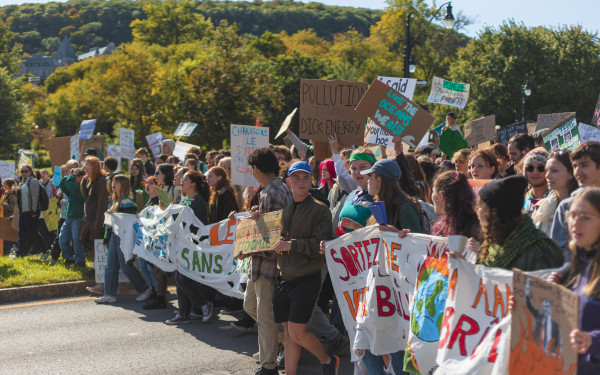Feasting and Fighting Resource Extraction
Annual Fall Feast Features Indigenous Activists
Roughly 200 people met last Thursday evening to share food, stories of resistance and activist documentaries for the annual gathering at the Native Friendship Centre of Montreal.
“Oftentimes, when colonialism is talked about, people are like, ‘Oh you know, that happened and now it’s over,” said James Goddard from the Frigo Vert, one of the feast’s main organizers.
“But obviously there are ongoing struggles and there are issues that arose from the past that can still be called colonialism.”
The island of Montreal, traditionally known as Tiotia:ke in the language of the Kanien’kehá:ka, has historically been a meeting place for other indigenous nations. Those living on the territory of Kanien’kehá:ka were known as the keepers of the Eastern Door and were responsible for maintaining peace in the east.
To celebrate this idea, the Native Friendship Centre invited activists from across the country and anyone who was interested in listening to their stories of peaceful resistance.
“I will support these struggles,” said Huguette Lucas, one of the attendees and a former communications officer at the Université du Québec à Montréal. “I also supported Idle No More.”
Lucas, who has been supportive of indigenous clashes with government and organized events as a member of the Cercle des Premières Nations at UQAM, said she wasn’t completely sure what the conference was about and came after getting a pamphlet in the mail.
As people lined up for servings of homemade soup, stuffing and mashed sweet potato, speakers from as far away as British Columbia shared stories of local movements against mining, oil development and pipelines.
Kanien’kehá:ka activist Clifton Nicholas screened his film Karistatsi Onienre: The Iron Snake, which is about tar sands development featuring indigenous leaders that are fighting for the protection of their water and land.
Innu elder Denise Jourdain, from the community of Uashat mak Mani-Utenam on the north shore of the St. Lawrence River, discussed her community’s struggle against Hydro Quebec’s expansion along the north shore and the province’s Plan Nord, an economic development plan focused on mining. In 2012, Jourdain was arrested during a blockade on the road leading to Hydro-Quebec’s new Romaine complex.
A main force against Imperial Metals, the mining company responsible for one of Canada’s biggest environmental disasters, Kanahus Manuel from the Secwpemc Nation in British Columbia has continued working to block new mining operations in the province.
The Mount Polley mining breach in August unleashed 10 billion litres of mining waste into B.C. waterways, turning Hazeltine creek into a field of sludge and contaminating Quesnel Lake, which used to be one of the cleanest and deepest lakes in Canada and home to wild salmon.
“It’s important for us as indigenous people to unite with other indigenous and other peoples of resistance to make our fight stronger and more powerful to fight this big beast that is industry and resource extraction,” said Manuel.
The event used to be called the Anti-Colonial Thanksgiving, but this year organizers opted for Fall Feast, in line with the night’s anti-imperialist ideas.
“Because Thanksgiving itself is inherently tied up in the myths of colonialism, we wanted to make it a dinner and fall celebration,” said Goddard.
The Frigo Vert, in collaboration with the Concordia Student Union, Kanata, Midnight Kitchen, People’s Potato, GRIP UQAM, QPIRG Concordia and QPIRG McGill organized this year’s feast to raise awareness and create a space where people can discuss native issues.
“Part of it is to create linkages to the community that does stuff here at the Native Friendship Centre and the Concordia student community,” said Goddard. “And part of it is about trying to break bread with as many people as possible.”
People’s Potato and Midnight Kitchen prepared the meal from ingredients provided by the Frigo Vert. The CSU helped cover the travel costs of the speakers.
“It’s a very concrete way to show solidarity, by providing food for an event like this,” said Kota Harbron from the People’s Potato. “And so that the organizers aren’t stuck coordinating everything or paying for catering.”
“When you offer people free food, you get all sorts of different people to come,” said Goddard.

_900_472_90.jpg)


__600_375_s_c1.png)
-7_600_375_90_s_c1.jpg)

